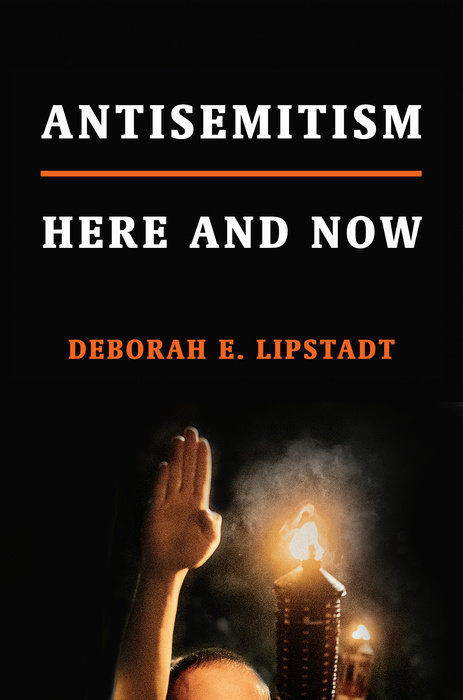Lipstadt’s eyes ‘Antisemitism: Here and Now’
Professor Deborah Lipstadt is one of the world’s most prominent scholars on the Holocaust and anti-Semitism. In 1996, she was famously sued for libel by self-proclaimed historian David Irving for characterizing his work as Holocaust denial in her 1993 book Denying the Holocaust: The Growing Assault on Truth and Memory. Lipstadt wrote about her victory in her 2005 book History on Trial: My Day in Court with a Holocaust Denier, which became a 2016 film starring Rachel Weisz as Lipstadt.
She released her eighth book, Antisemitism: Here and Now, this month. This interview with Lipstadt has been edited for brevity and clarity.
How does your latest work stand out from your other published books?
This book is very different from my previous books, which dealt with history. This book is about contemporary events, so that made it very different to write. There were pages I wanted to add: A Holocaust survivor in Paris murdered in her apartment, [British Labour Party leader] Jeremy Corbyn going to the burial of a perpetrator behind the 1972 [massacre of Israeli athletes and coaches at the] Munich Summer Olympics. Every day there seemed to be something.
The irony is that while it was a harder book to write, it was a hard book to finish with all that was [and is] going on. I was willing to predict — and I don’t usually make predictions — that by the time the book was finished, something will have happened that should’ve been in this book. Then came the Tree of Life*Or L’Simcha Synagogue shooting in Pittsburgh [on Oct. 27, 2018].
You have likened anti-Semitism to a conspiracy theory. Is it more than that?
Of course. Part of the reason I wrote the book as a series of letters is so that people understand what’s going on, understand the phenomenon of anti-Semitism, which makes no sense, is completely irrational. This is different than other forms of racism because the racists see power as diminishing their majority gene pool. The anti-Semite sees the Jew as smarter than them. Whereas racism is punching down, anti-Semitism is punching up.
Having said that, let me go back to the conspiracy part. It is very important to understand the conspiracy theory because conspiracy theories make no sense. People turn to them when they can’t make sense of some event, or something happened to them and they need someone to blame. It’s irrational, and that’s what anti-Semitism is. Anti-Semitism is totally irrational: The Jews are Communists, the Jews are capitalists. You can’t be a Communist and a capitalist at the same time. The fact that it’s a conspiracy theory helps explain why it keeps popping up.
What is your response to those who say that the 57 percent rise in anti-Semitic incidents in 2017 was inflated because 24 percent were attributed to a disturbed teenager in Israel and a fired reporter from The Intercept?
One of the reasons I don’t rely on statistics, certainly not statistics alone, is because of incidents such as these. There are a number of ways of looking at this. Yes, the [Israeli] teenager [who threatened violence at Jewish Community Centers in North America] was a Jew, but he was clearly aware of the fear he would cause. So what is 24 percent of 57 percent? It is still a significant rise. Anyone who makes this argument is looking for a way to ignore reality. There have been too many incidents — from both the right and left ends of the spectrum, and from Islamist extremists — to say all is well. Yes, this information is anecdotal, but when you hear it in the United Kingdom, Sweden, Paris, and New York City, you begin to pay attention to anecdotes.
What’s your reaction to the anti-Israel verbiage coming from House representatives Ilhan Omar and Rashida Tlaib?
Yair Rosenberg wrote in Tablet that Omar may be salvageable. But I think it’s horrific; posting “It’s all about the Benjamins baby.” She didn’t understand the connotations of what she was saying. What it shows is an inebriate kind of anti-Semitic stereotype … I feel very disturbed by it, and I hope some of these people get educated. Otherwise, I hope they get relegated to the far corner of the political [world].
Of course, anti-Semitism isn’t just coming from the left, it’s also coming from the right. House Minority Leader Kevin McCarthy a couple months ago said that [donors to the Democratic Party] Michael Bloomberg, George Soros [and Tom Steyer] were trying to “buy” the midterm elections. And then there was a pipe bomb found in the mailbox of Soros.
In the aftermath of tragedies such as the Tree of Life shooting, why do we still see divisiveness among Jews?
Jews are a people. We’re a feisty people. The Torah even says am keshei oref (“a stiff-necked people”). We fight with one another, and we’ll continue to do so. Rather than to say, “Oh they’re terrible Jews, they fight with one another. Why can’t they get it together?” often the differences of opinion come out of caring. A lot of Jews care very deeply. Often, the differences of opinion come from that [place], as opposed to saying, “I’m going to fight you because you’re on the other side, and I don’t like you.” So I’m going to give people the benefit of the doubt. But I don’t know what can bring us together. In the Warsaw Ghetto, when the resistance was wanting to fight the Nazis, there was a difference of opinion.
Are you working on future projects?
I have another book in the offing on a very different topic. I’m not yet ready to talk about it because it’s sort of just brewing in my mind.
But there’s a lot of interest in this [latest] book, and I’m very gratified by it. It was a tough book to write. I want people on the left to understand what’s happening on the left, and I want people on the right to understand what’s happening on the right, so that people will understand how things often morph into anti-Semitism.
What else would you like readers to know about anti-Semitism?
I hope people read my book with nuance, with care. I didn’t set out with a political agenda to attack one side or the other. I found anti-Semitism on the left and on the right and among Islamist extremists and in portions of the Muslim community among people who might never think about doing any physical harm in the Jewish community, but have been inculcated with the anti-Semitism by imams, by others.
In London, the secretary general of the Labour Party [Jennie Formby] said that there’s nothing we can do about anti-Semitism in the party, we just have to learn to deal with it. Can you imagine her saying that about racism? About misogyny? It’s just mind-boggling. I hope people read the book and take off their political lenses. Rather than only look on the other side of the political spectrum — people on the left only care about anti-Semitism on the right and on the right they only see anti-Semitism on the left — so I hope people read with care, and I hope it helps people understand this phenomenon.

 48.0°,
Overcast
48.0°,
Overcast 







